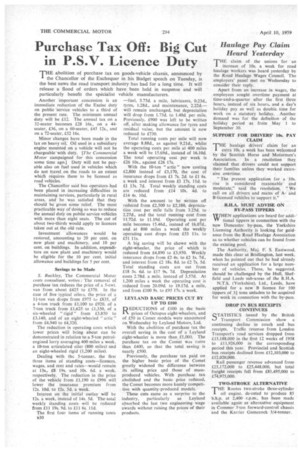Purchase Tax Off: Big Cut
Page 36

If you've noticed an error in this article please click here to report it so we can fix it.
in P.S.V. Licence Duty
THE abolition of purchase tax on goods-vehicle chassis, announced by I the Chancellor of the Exchequer in his Budget speech on Tuesday, is the best news the road transport industry has had for a long time. It will release a flood of orders which have been held in suspense and will particularly benefit the specialist vehicle manufacturers.
Another important concession is an immediate reduction of the Excise duty on public service vehicles to a third of the present rate. The minimum annual duty will be £12. The annual tax on a 32-seater becomes £28 16s., on a 44seater, £36, on a 60-seater, £45 .12s., and on a 72-seater, £52 16s.
Minor changes have been made in the tax on heavy oil. Oil used in a subsidiary engine mounted on a vehicle will not be chargeable with duty. [The Commercial Motor campaigned for this concession some time ago.} Duty will not be payable also on fuel used in vehicles which do not travel on the roads to an extent which requires them to be licensed as road vehicles.
The Chancellor said bus operators-had been placed in increasing difficulties in maintaining services, particularly in rural
areas, and he was satisfied that they should be given some relief. The most practicable way of doing so was to reduce the annual duty on public service vehicles with more than eight seats. The cut of about two-thirds would apply to licences taken out at the old rate.
Investment allowances would be restored, amounting to 20 per cent, on new plant and machinery, and 10 per cent, on buildings. In addition, expenditure on new plant and machinery would be eligible for the 10 per cent. initial allowance and buildings for 5 per cent.
Savings to be Made S'. Buckky, The Commercial Motor costs consultant, writes : The removal of purchase tax reduces the price of a 5-cwt. van from about 4425 to £370. In the case of five typical oileis, the price of a 14-ton van drops from £975 to £835, of a 4-ton truck from £1,100 to £920, of a 7-ton truck from £1,625 to £1,350, of a six-wheeled " rigid " from £3,850 to £3,140, and of an eight-wheeled " artic " from £4,940 to £4,320.
The reduction in operating costs which lower prices will bring about can be demonstrated in relation to a 5-ton petrolengined lorry averaging 400 mites a week, a 10-ton articulated oiler (800 miles) and an eight-wheeled rigid (1,200 miles).
Dealing with the 5-tanner, the first three items of standing costs-licences, wages, and rent and rates-would remain at lls., £8 19s. and 10s. 6d. a week, respectively. The reduction in the price of the vehicle from £1,190 to £996 will lower the insurance premium from 12s. 10d, to 12s. 5d. a week.
Interest on the initial outlay will be 12s. a week, instead of 14s. 5d. The total weekly standing costs will be reduced from £11 19s. 9d. to £11 6s. 11d.
• The first fot1r items of running costs ti30 3.75d. a mile, lubricants, 0.23d., tyres, 1-.28c1., and maintenance, 2.22d.will remain unchanged, but depreciation will drop from 1.73d. to 1.40d. per mile. Previously, £900was left to be written off, after making allowance for tyres and residual value, but the amount is now reduced to £730.
Total running costs per mile will now average 8.88d., as against 9.21d., whilst the operating costs per mile at 400 miles a week will be 15.69d., instead of 16.10d. The total operating cost per week is £26 10s., against £26 17s.
With the 10-ton " artic " now costing £2,800 instead of £3,170, the cost of insurance drops from £1 7s. 2d. to £1 6s. a week and interest from £1 17s. lid. to £1 13s. 7d. Total weekly standing costs are reduced from .£14 10s. 4d. to £14 4s. 10d.
With the amount to be written off reduced from £2,500 to £2,180, depreciation cost per, mile falls from 3.25d. to 2.27d., and the total running cost from 11.72d. to 11.19d. Operating cost per mile becomes 15.46d., instead of 16.07d., and at 800 miles a week the weekly operating cost drops from £53 1 ls. to £51 Its.
A big saving will be shown with the eight-wheeler, the price of which is reduced from £4,890 to £3,950. Weekly insurance drops from £2 4s. to £2 ls. 7d., and interest from £2 18s. 8d, to £2 7s. 5d. Total standing costs are cut from 118 3s. 6d. to £17 9s. 7c1. Depreciation costs 2.78d. a mile, instead of 3.57d. At 1,200 miles a week the operating cost is reduced from 20.09d. to 19.17d. a mile, and from £100.9s. to 495 17s. -a week.
LEYLAND BASIC PRICES CUT BY UP TO UN
REDUCTION S of £100 in the basic prices of Octopus eight-wheelers, and of £50 in Comet models were announced on Wednesday by Leyland Motors, Ltd.
With the abolition of purchase tax the overall saving in the cost of a Leyland eight-wheeler is more than £1,000. The purchase tax on the Comet was more than £400, so that the total saving is nearly £500.
Previously, the purchase tax paid on the higher basic price of the Comet greatly widened the difference between its selling price and those of massproduced vehicles. With purchase tax abolished and the basic price reduced, the Comet becomes more keenly competi. five with quantity-produced models, These cuts came as a surprise to the industry, particularly as Leyland absorbed the last two engineering wage awards withciut raising the prices of their products.












































































































